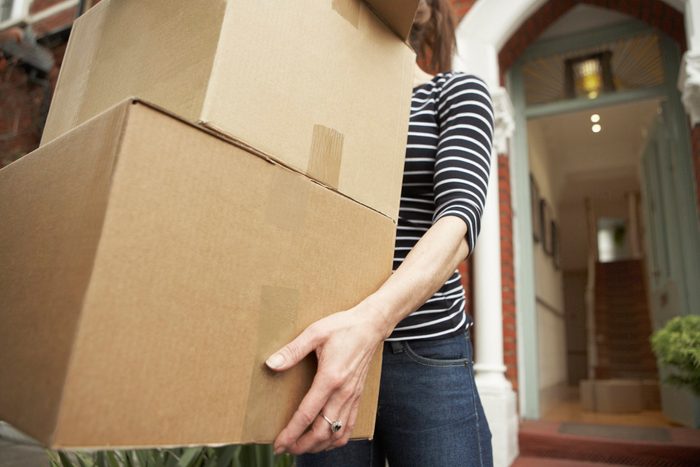
You’re lifting heavy objects
You may think it’s harmless to pick up one end of the couch while you’re moving, but it could cause you to bear down too hard. That increases pressure in the rectum, causing the veins (called the hemorrhoidal plexus) to swell like a balloon, says Darren Brenner, associate professor of medicine at Northwestern University Feinberg School of Medicine and a gastroenterologist at Northwestern Medical Group in Chicago. Boom: hemorrhoids. Unfortunately, there’s no surefire way to avoid this completely. Try lifting correctly—you know, with your knees, not your back—can help.
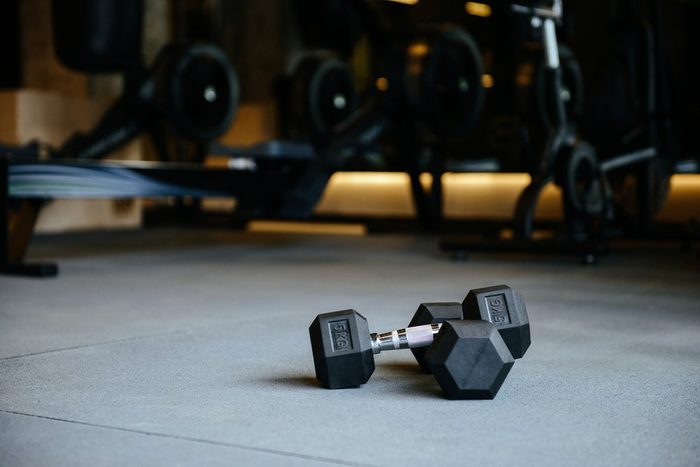
You’re over-ambitious when exercising
For the same reason hoisting a big box can give you hemorrhoids, so too can lifting heavy weights at the gym, says Dr. Brenner. The idea is to challenge yourself, of course, but make sure that you’re catering the workout to your abilities, and using weights that are right for you. (Related: These strength-lifting mistakes can ruin your workout.)
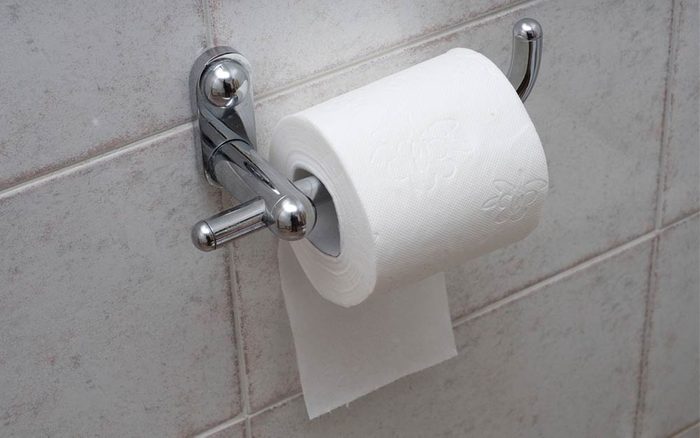
You’re sitting on the toilet too long
When thinking about what causes hemorrhoids, consider your toilet time. Sure, it’s nice to hang out with your smartphone in the bathroom—it’s so quiet and relaxing in there!—but sitting too long on an open toilet bowl will cause gravity to put undue stress on these veins. Take all the time you need to go, says Dr. Brenner, but once you’re done, flush and head out. (Related: Check out these home remedies for constipation relief.)

Your diet isn’t that great
If you’re making too many fast-food runs or relying on packaged snacks to get through the day, you may not be getting enough fibre. The necessary nutrient helps bulk up and soften your stool so it can sail through your GI tract smoothly.
“Consuming an adequate amount of fibre—whether through food, supplements, or a combination—leads to bulkier stools, which are then generally softer,” explains David Greenwald, director of clinical gastroenterology and endoscopy at Mt. Sinai Hospital in New York City. “The typical recommendation for adults is 25 to 30 grams of fibre per day, along with 64 ounces of fluid.” A review of studies published in 2015 in World Journal of Gastroenterology shows that supplementing with fibre helps lessen hemorrhoid symptoms and bleeding. (Related: Here’s how to get more fibre into your diet.)
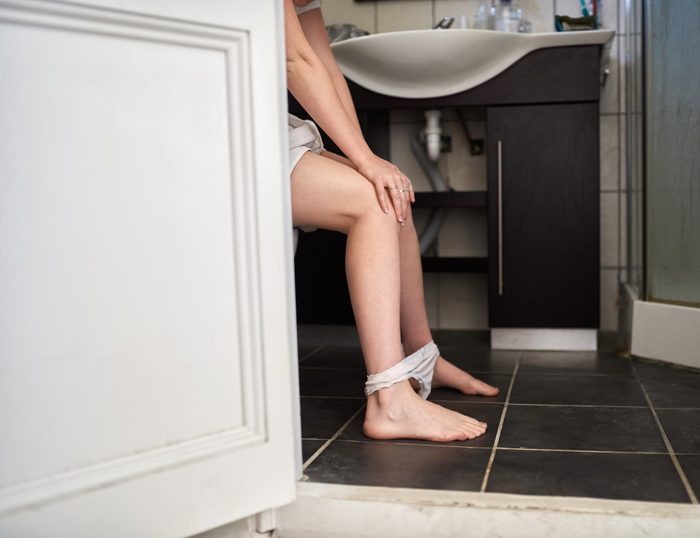
You just can’t go
If you go number two fewer than three times a week, you’re probably constipated. And the associated straining over lumpy, hard stools “causes the anal cushions that support these veins to become stretched, leading the hemorrhoidal veins to dilate and possibly lead to symptoms,” says Dr. Greenwald. Exercising, eating enough fibre, and sipping enough water to address thirst are all lifestyle tweaks you can make to get more regular.
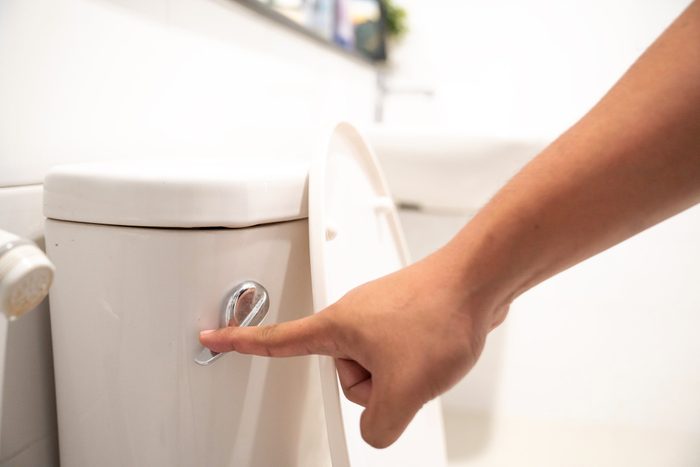
You have diarrhea
One of the most common hemorrhoid causes is going too often. You’d think the result would be just the opposite. But pooping multiple times a day means you spend a lot of time on the toilet, possibly bearing down and straining. The fix, says Dr. Brenner, is to address the underlying reason behind your diarrhea. It may be viral (like the flu), irritable bowel syndrome (IBS), medications, foodborne illness, or you may need to simply tweak your diet. (Related: Be sure to make these diet changes if you have IBS.)
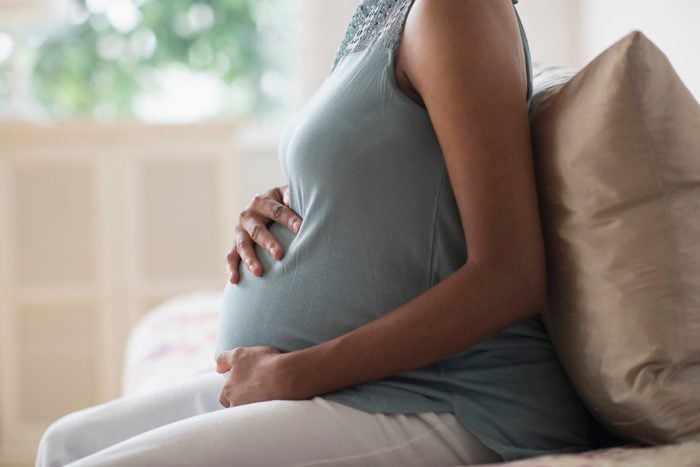
You’re pregnant
Growing a tiny human is a beautiful—but often not-so-glamorous—process. “Pregnancy leads to straining, thought to be from increased intra-abdominal pressure from the expanding uterus and fetus,” says Dr. Greenwald.”It can be very troublesome for pregnant women. Many continue to have hemorrhoids following the delivery of the baby.” In fact, a review of studies, published in 2014 in BJOG: An International Journal of Obstetrics and Gynaecology, found that almost 41 percent of pregnant women get hemorrhoids. They’re especially common during the last trimester and one month after delivery. Traditional treatment, such as eating more fibre, staying hydrated, and taking stool softeners, can help expectant moms.

You skipped your workout class
Everybody knows that being active goes a long way toward helping you maintain a healthy weight. But did you know that it can also lessen your odds of getting hemorrhoids? “Regular exercise—greater than 30 minutes per day of aerobic exercise—helps improve regular bowel functional,” says Dr. Greenwald.
But that’s not the only reason. A study published in the International Journal of Colorectal Disease found a connection between BMI (body mass index) and hemorrhoids. For every point increase in BMI, adults had a 3.5 percent higher risk of suffering from hemorrhoids. That’s because excess weight applies extra pressure on the anal area.
Next, learn the signs you’re already at a healthy weight.
